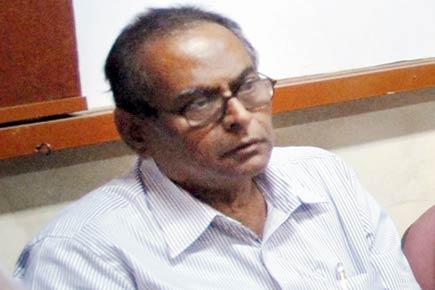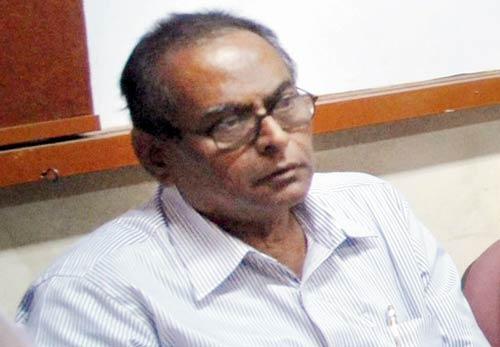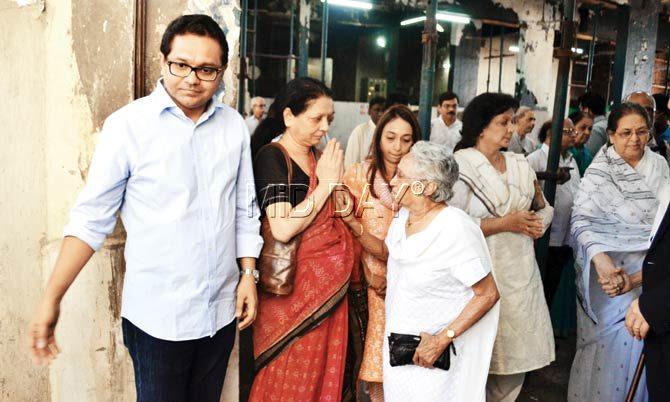Scholar-journalist Aroon Tikekar, who passed away today aged 72, was one of the last “Englishmen” in the Marathi media

 There are not many journalists who belong to the genre of Dr Aroon Tikekar. He was a scholar-journalist who had a kind of dignified pride in being a historian and scholar first and, by accident, a journalist. Though he enjoyed being the editorial writer and chief editor, he never gave up the role of a researcher in the editorial chair.
There are not many journalists who belong to the genre of Dr Aroon Tikekar. He was a scholar-journalist who had a kind of dignified pride in being a historian and scholar first and, by accident, a journalist. Though he enjoyed being the editorial writer and chief editor, he never gave up the role of a researcher in the editorial chair.
ADVERTISEMENT

Aroon Tikekar (February 1, 1944 - January 19, 2016)
He used to say that his best friends were books, which he would buy and fondle them like young kids. His hobby was to spend time at home arranging books, sometimes according to the subjects and at other times according to the authors. Then there was the special shelf for rare books and classics. He used to show his collection of “first editions”, signed by the author, or bought after tremendous trouble. There was no Amazon or Flipkart, not even Internet and Wikipedia, in those days and hunting for books was itself an adventure of sorts. The ecstasy that tiger lovers these days experience when they spot tiger after spending hours in the jungle could be compared to his delight after he got a book he was looking for months, or even years. Therefore, when abroad, mainly in England, his time would be spent in the large bookshops. He was particularly fond of shops that sold old, rare, used books.

Aroon Tikekar’s family and friends gathered for his funeral at Shivaji Park in Dadar. Pic/Datta Kumbhar
In a way, he was one of the last “Englishmen” in the Marathi media. He was editor of Loksatta for nearly 11 years and was associate editor for over six years in the Maharashtra Times. But he was a bilingual journalist who entered the profession through English media, mainly as a critic and columnist. His association with books and scholars made him a media professional. Even his entry into the Times Group as a journalist was through the grand Reference Department-cum-Library that Bennett Coleman had. He came to that department from the US Library of Congress. His “temple” where he regularly visited was Strand Books and later Kitab Khana.
He became chairman of the Asiatic Library after retiring from journalism. He was more at home there with planning research projects, organising lectures of leading historians and scholars and renowned writers. His brother too was a well-known and popular librarian at the Bombay University. So the culture of books and scholarship was in the family. His uncle was a leading critic-commentator in the mid-twentieth century.
He had a personal collection of nearly 20,000 books. Subjects that absorbed him were literary criticism and social histories, cultural studies and socio-anthropology, biographies and autobiographies and travelogues and memoirs of 19th century scholars and writers. Any young aspiring journalist, writer or researcher could approach him and he would flood the young girl or boy with references of books and articles. He would lend them generously (though it used to pain him to hand over the books, never sure of their return). When he donated several thousand books to a library, he felt like his life was getting sliced. But he was also happy that his excellent collection would be available for many, though unknown, readers. It was more a generosity of spreading knowledge, awareness, and cultural consciousness rather than merely giving away books.
He wrote a creative biography of the University of Bombay, “The Cloister’s Pale”, which showed his deep interest in the 19th century and the British traditions. Indeed he respected the classical English legacy even more than the Indian traditions. In fact, he was staunchly opposed to the fanaticism of any kind, particularly of the saffron variety. It was inevitable that he invited the violent wrath of Balasaheb Thackeray. He had to move with special security, which he loathed, but could not help its presence.
He was soft-spoken like an English gentleman, but that did not mean that he did not have strong views. He used to be strident in his criticism, be it of politician or policy, of theatre or a film, of a book or of declining intellectual standards.
He used to say recently that he was finding himself rather out of place and disconnected, because he could not belong to the Internet generation and dispense Facebook/Twitter-style spontaneous wisdom. Though he felt that way, his zest for life, for controversies, for buying books had not diminished.
Though I knew him for nearly 40 years, even before he acquired doctorate, his style, writing, thinking and discussing was that of a scholar. Though erudite, he did not show off. It is this style, his liberal and secular views, his cultured and intellectual attributes made the real scholar-journalist who carried the 19th century cross on his back.
Senior journalist Kumar Ketkar was Aroon Tikekar’s successor as Loksatta editor
 Subscribe today by clicking the link and stay updated with the latest news!" Click here!
Subscribe today by clicking the link and stay updated with the latest news!" Click here!






